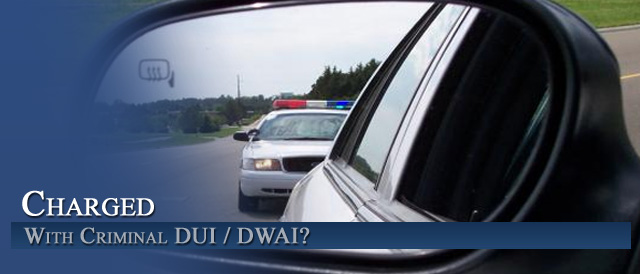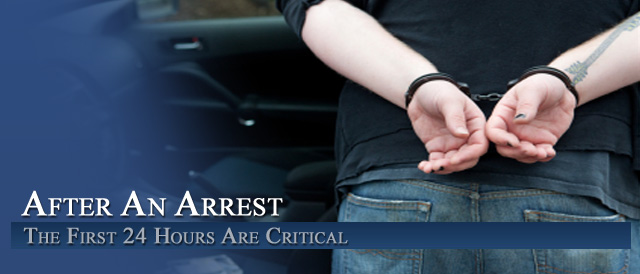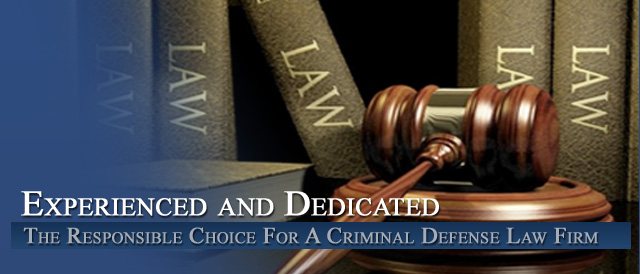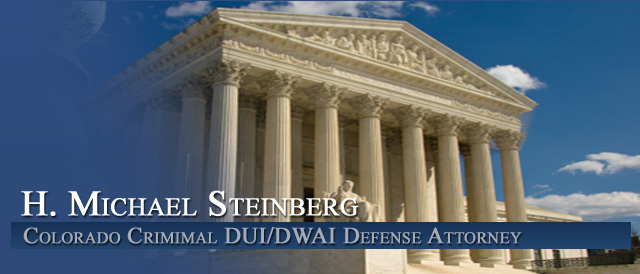




Colorado’s Habitual Traffic Offender Law – and 42-2-206 – Driving After Revocation Prohibited – DAJP
by Colorado Criminal Defense Attorney – Lawyer for Traffic Matters – H. Michael Steinberg
 In 2010 – the Colorado State Legislature changed the Driving After Judgement and created an odd criminal law statute that creates a mandatory jail sentence of 30 days which CAN be suspended upon the payment of massive fines (up to $3,000.00) and massive amounts of volunteer work (up to 300 hours) but does NOT provide for a period of probation.
In 2010 – the Colorado State Legislature changed the Driving After Judgement and created an odd criminal law statute that creates a mandatory jail sentence of 30 days which CAN be suspended upon the payment of massive fines (up to $3,000.00) and massive amounts of volunteer work (up to 300 hours) but does NOT provide for a period of probation.
Here is the law with my commentary:
42-2-206 – Driving After Revocation Prohibited
(1)(a)(I) It is unlawful for any person to operate any motor vehicle in this state while the revocation of the department prohibiting the operation remains in effect. Any person found to be an habitual offender, who operates a motor vehicle in this state while the revocation of the department prohibiting such operation is in effect, commits a class 1 misdemeanor.
(II) Notwithstanding the provisions of section 18-1.3-501, C.R.S., any person convicted of violating subparagraph (I) of this paragraph (a) shall be sentenced to a mandatory minimum term of imprisonment in the county jail for thirty days, or a mandatory minimum fine of three thousand dollars, or both.
[HMS – but see further – the jail can be suspended]
The minimum jail sentence and fine required by this subparagraph (II) shall be in addition to any other penalty provided in section 18-1.3-501 , C.R.S.
The court may suspend all or a portion of the mandatory jail sentence or fine if the defendant successfully completes no less than forty hours, and no greater than three hundred hours, of useful public service. In no event shall the court sentence the convicted person to probation.
Upon the defendant’s successful completion of the useful public service, the court shall vacate the suspended sentence. In the event the defendant fails or refuses to complete the useful public service ordered, the court shall impose the jail sentence, fine, or both, as required under this subparagraph (II).
[HMS- The Colorado Crime of Aggravated Driving with a Revoked License]
(b)(I) A person commits the crime of aggravated driving with a revoked license if he or she is found to be an habitual offender and thereafter operates a motor vehicle in this state while the revocation of the department prohibiting such operation is in effect and,
…. as a part of the same criminal episode, also commits any of the following offenses:
(A) DUI or DUI per se;
(B) DWAI;
(C) Reckless driving, as described in section 42-4-1401 ;
(D) Eluding or attempting to elude a police officer, as described in section 42-4-1413 ;
(E) Violation of any of the requirements specified for accidents and accident reports in sections 42-4-1601 to 42-4-1606 ; or
(F) Vehicular eluding, as described in section 18-9-116.5 , C.R.S.
(II) Aggravated driving with a revoked license is a class 6 felony, punishable as provided in section 18-1.3-401 , C.R.S.
(III) If a defendant is convicted of aggravated driving with a revoked license based upon the commission of DUI, DUI per se, or DWAI pursuant to sub-subparagraph (A) or (B) of subparagraph (I) of this paragraph (b):
(A) The court shall convict and sentence the offender for each offense separately;
(B) The court shall impose all of the penalties for the alcohol-related driving offense, as such penalties are described in section 42-4-1307 ;
(C) The provisions of section 18-1-408, C.R.S, shall not apply to the sentences imposed for either conviction;
(D) Any probation imposed for a conviction under this section may run concurrently with any probation required by section 42-4-1307 ; and
(E) The department shall reflect both convictions on the defendant’s driving record.
(2) For the purpose of enforcing this section in any case in which the accused is charged with driving a motor vehicle while such person’s license, permit, or privilege to drive is revoked or is charged with driving without a license, the court, before hearing such charges, shall require the district attorney to determine whether such person has been determined to be an habitual offender and by reason of such determination is barred from operating a motor vehicle on the highways of this state. If the district attorney determines that the accused has been so held, the district attorney shall cause the appropriate criminal charges to be lodged against the accused.
Cite as C.R.S § 42-2-206
[HMS – Here is the Colorado Habitual Offender Law:]
42-2-202. Habitual Offenders – Classified.
1.An habitual offender is any person, resident or nonresident, who has accumulated convictions for separate and distinct offenses described in subsection (2) of this section committed during a seven-year period or committed during a five-year period for separate and distinct offenses described in subsection (3) of this section;
….except that, where more than one included offense is committed within a one-day period, such multiple offenses shall be treated for the purposes of this part 2 as one offense. The record as maintained in the office of the department shall be considered prima facie evidence of the said convictions.
2.a. An habitual offender is a person having three or more convictions of any of the following separate and distinct offenses arising out of separate acts committed within a period of seven years:
I. DUI, DUI per se, DWAI, or habitual user;
II. Driving a motor vehicle in a reckless manner, in violation of section 42-4-1401;
III. Driving a motor vehicle upon a highway while such person’s license or privilege to drive a motor vehicle has been denied, suspended, or revoked, in violation of section 42-2-138;
IV. Knowingly making any false affidavit or swearing or affirming falsely to any matter or thing required by the motor vehicle laws or as to information required in the administration of such laws;
V. Vehicular assault or vehicular homicide, or manslaughter or criminally negligent homicide which results from the operation of a motor vehicle, or aggravated motor vehicle theft, as such offenses are described in title 18, C.R.S.;
VI. Conviction of the driver of a motor vehicle involved in any accident involving death or personal injuries for failure to perform the duties required of such person under section 42-4-1601.
b. The offenses included in subparagraphs (I), (II), (III), and (V) of paragraph (a) of this subsection (2) shall be deemed to include convictions under any federal law, any law of another state, or any ordinance of a municipality that substantially conforms to the statutory provisions of this state regulating the operation of motor vehicles. For purposes of this paragraph (b), the term “municipality” means any home rule or statutory city or town, a territorial charter city, or a city and county.
3.A person is also an habitual offender if such person has ten or more convictions of separate and distinct offenses arising out of separate acts committed within a period of five years involving moving violations which provide for an assessment of four or more points each or eighteen or more convictions of separate and distinct offenses arising out of separate acts committed within a period of five years involving moving violations which provide for an assessment of three or less points each in the operation of a motor vehicle, which convictions are required to be reported to the department and result in the assessment of points under section 42-2-127, including any violations specified in subsection (2) of this section.
4.For the purpose of this section, the term “conviction” has the meaning specified in section 42-2-127 (6) and includes entry of judgment for commission of a traffic infraction as set forth in section 42-4-1701.
[HMS – Here is the Statute Defining the Punishment in Colorado for All Non- Specific Misdemeanors]
§ 18-1.3-501. [Effective 7/1/2012] Misdemeanors Classified – Penalties
(1) (a) Misdemeanors are divided into three classes which are distinguished from one another by the following penalties which are authorized upon conviction except as provided in subsection (1.5) of this section:
Class – Minimum Sentence and Maximum Sentence
1 – Six months imprisonment, or five Eighteen months imprisonment, hundred dollars fine, or both or five thousand dollars fine, or both
2 – Three months imprisonment, or two Twelve months imprisonment, hundred fifty dollars fine, or both or one thousand dollars fine, or both
3 – Fifty dollars fine Six months imprisonment, or seven hundred fifty dollars fine, or both
(b) A term of imprisonment for conviction of a misdemeanor shall not be served in a state correctional facility unless served concurrently with a term for conviction of a felony.
(c) A term of imprisonment in a county jail for a conviction of a misdemeanor, petty, or traffic misdemeanor offense shall not be ordered to be served consecutively to a sentence to be served in a state correctional facility; except that if, at the time of sentencing, the court determines, after consideration of all the relevant facts and circumstances, that a concurrent sentence is not warranted, the court may order that the misdemeanor sentence be served prior to the sentence to be served in the state correctional facility and prior to the time the defendant is transported to the state correctional facility to serve all or the remainder of the defendant’s state correctional facility sentence.
…..
Colorado Habitual Offenders and the Civil Seizure and Forfeiture of Your Vehicle
In Colorado Habitual Traffic Offender Cases -the City and County of Denver May SEIZE and Keep Your Car as a So Called “Public Nuisance”
Denver Nuisance & Abatement Defense Attorney and Lawyer – H. Michael Steinberg
The city and county of Denver – since 2008 – has been seizing the vehicles – even those not owned by the charged habitual traffic offender – and trying to take ownership of those cars under a tricky law known as a Public Nuisance law. This law states that the Denver police may impound and seize vehicles used in habitual offense offenses.
Vehicles which are driven by habitual traffic offenders are identified as a “public nuisance” and may legally be and permanently taken by the City of Denver through forfeiture proceedings.
Denver’s Nuisance Abatement Law
The Denver Police Department Nuisance Abatement Unit “works directly with” the City Attorney’s Office and the D.A.’s Office to “identify, abate, deter, and prevent the recurrence of public nuisances within the City of Denver.”
The Unit “accomplishes this” by filing for seizure of property & cars, and other court orders to abate the problem.
What is a “Public Nuisance?”
A public nuisance is what you think – it is NOT a trashy yard or neglected home. No -this kind of public nuisance is:
…. any real property or vehicle where criminal activity occurs. The activity can include drug violations, gambling, sex offenses, weapon offenses, gang activity, noise offenses, and disturbing the peace.
Seizure of a vehicle is allowed without a prior court hearing. This is a huge hardship to impose on people who may lose their only mode of getting to work or to a doctor. Denver R.M.C. § 37-73 ( the Denver Revised Municipal Code)
Here is how the Denver Police Department defines why they can seize your car:
What is a “Hold”? Why can’t I see or recover my car? Why can’t I get my property?
Some vehicles are impounded in connection with a crime.
The vehicle may be held for evidence – fingerprints, drug paraphernalia, blood or other DNA evidence, etc. The vehicle may have been involved in a hit and run, was in a fatal accident or other activity requiring forensic processing, is a stolen vehicle or needs to be held for a court proceeding.
The vehicle may have been involved in a public nuisance violation – driven by a habitual traffic offender, involved in a prostitution case, drugs (selling, buying or transporting), a drive by shooting, etc.
In these cases, the police department will place a “HOLD” on the vehicle until they are done with the car for their court case. While the car is on hold, only the case detective will have access to the vehicle. All inquiries regarding access to the vehicle to get property or items from the car will be directed to the case detective. Once the case detective drops their hold and no other holds are on the vehicle, the owner may recover their vehicle by paying all the accumulated fees. Fees do accumulate will the vehicle is being held for investigation. Some fees may be waived if they meet the requirements listed in Ordinance 54-813.
Here is a LINK to the Denver Statute on Nuisances and Public Abatement:
Please call our law firm if you have questions about .. this article.
Colorado’s Habitual Traffic Offender Law – and 42-2-206 – Driving After Revocation Prohibited – DARP
H. Michael Steinberg has been a Colorado criminal law specialist attorney for 40 years (as of 2012). For the First 13 years of his career, he was an Arapahoe – Douglas County District Attorney Senior prosecutor. In 1999 he formed his own law firm for the defense of Colorado criminal cases.
In addition to handling tens of thousands of cases in the trial courts of Colorado, he has written hundreds of articles regarding the practice of Colorado criminal law and frequently provides legal analysis on radio and television, appearing on the Fox News Channel, CNN and Various National and Local Newspapers and Radio Stations. Please call him at your convenience at 720-220-2277
If you have questions about Colorado Juvenile Mental Health Evaluations in the Denver metropolitan area and throughout Colorado, attorney H. Michael Steinberg will be pleased to answer those questions and to provides quality legal representation to those charged in Colorado adult and juvenile criminal matters.
In the Denver metropolitan area and throughout Colorado, attorney H. Michael Steinberg provides quality legal representation to those charged in Colorado adult and juvenile criminal matters.
Colorado’s Habitual Traffic Offender Law – and 42-2-206 – Driving After Revocation Prohibited – DARP.













